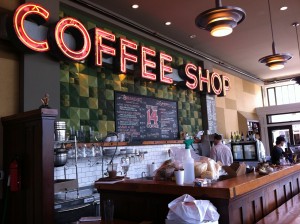Coffee Culture
So far it has been more difficult than I thought to say goodbye to my daily coffee trips. While I am enjoying the extra sleep, I find that by noon each day I usually cave and buy a cup. Since I am generally not planning on getting coffee, I never bring my reusable mug with me, which means that I end up using a paper cup. Even though I have found it difficult to change my behavior, I still have noticed that I am not buying as much coffee as I did before.
I would definitely say that I am addicted to coffee, which is my biggest challenge in adopting this sustainable behavior. Even though I am able to avoid it before class, eventually I give in to the addiction and buy it later on in the day. I also find that when I have a lot of work to do I usually end up buying the paper cup. This is because I am in too much of a hurry to get my reusable mug and I find that it is too much of an inconvenience. I have also found that when I am especially tired (which is also when I need the coffee the most) I tend to forget my mug and I will just buy a paper cup.
 A final challenge, that I had not anticipated, was the social aspect of coffee. A few times this past week, my friends have asked me to meet them for coffee. In these situations I usually don’t have time to go back to my room to get my mug. Even though it is easier in this situation to simply not get a coffee, it can be a little bit weird to go meet someone for coffee and then not get any coffee. While coffee’s popularity has often been attributed to its addictive properties, some argue that its social aspects are just as important. Coffee plants are able to adapt and are very versatile which means it is relatively easy to grow coffee plants in a wide range of locations; throughout history, coffee has been an extremely important trade commodity because of this. From its status as a “hospitality drink” in Africa, to its role in the Middle East and more specifically Islam, coffee has always been an important social drink. Coffeehouse culture developed in the Middle East, and these places were often seen as luxurious gathering-places. Coffeehouse culture has spread throughout the world and is now common in many places and cultures (Topik, 2009). Coffee is definitely a social drink, and while the social aspect of coffee has not been the greatest challenge that I have had to overcome, it is a challenge nonetheless.
A final challenge, that I had not anticipated, was the social aspect of coffee. A few times this past week, my friends have asked me to meet them for coffee. In these situations I usually don’t have time to go back to my room to get my mug. Even though it is easier in this situation to simply not get a coffee, it can be a little bit weird to go meet someone for coffee and then not get any coffee. While coffee’s popularity has often been attributed to its addictive properties, some argue that its social aspects are just as important. Coffee plants are able to adapt and are very versatile which means it is relatively easy to grow coffee plants in a wide range of locations; throughout history, coffee has been an extremely important trade commodity because of this. From its status as a “hospitality drink” in Africa, to its role in the Middle East and more specifically Islam, coffee has always been an important social drink. Coffeehouse culture developed in the Middle East, and these places were often seen as luxurious gathering-places. Coffeehouse culture has spread throughout the world and is now common in many places and cultures (Topik, 2009). Coffee is definitely a social drink, and while the social aspect of coffee has not been the greatest challenge that I have had to overcome, it is a challenge nonetheless.
Citation:
Topik, S. (2009). Coffee as a Social Drug. Cultural Critique, 71, 81-106. Retrieved March 31, 2014, from the JSTOR database.
Leave a Reply